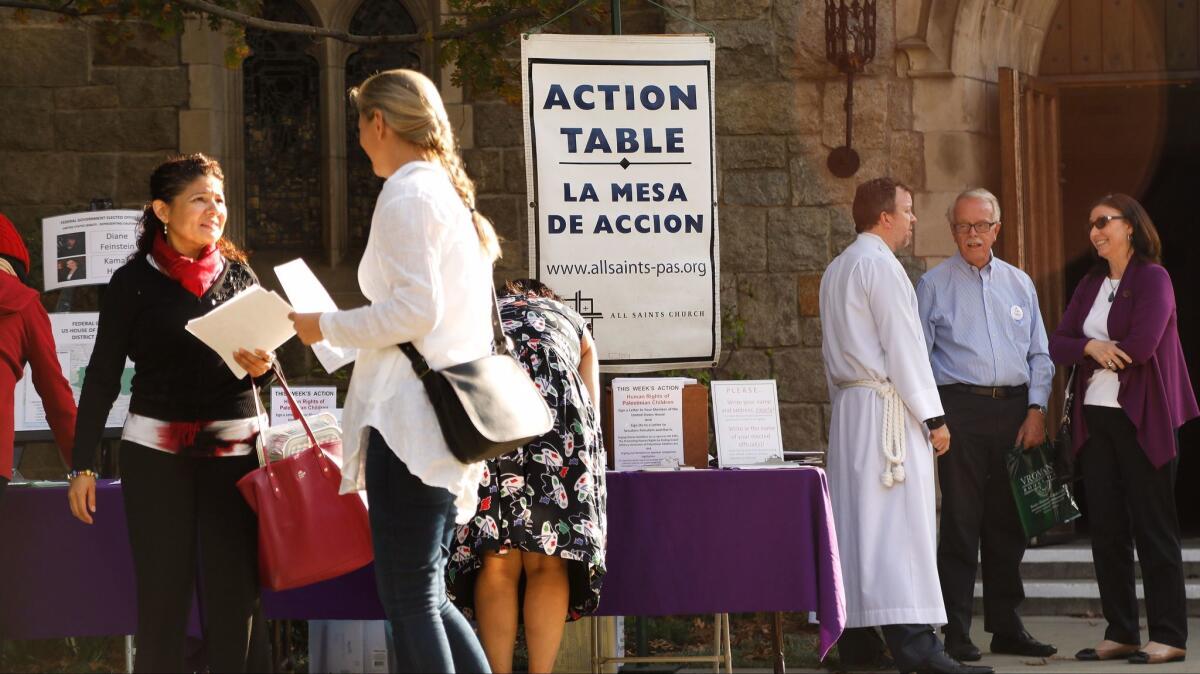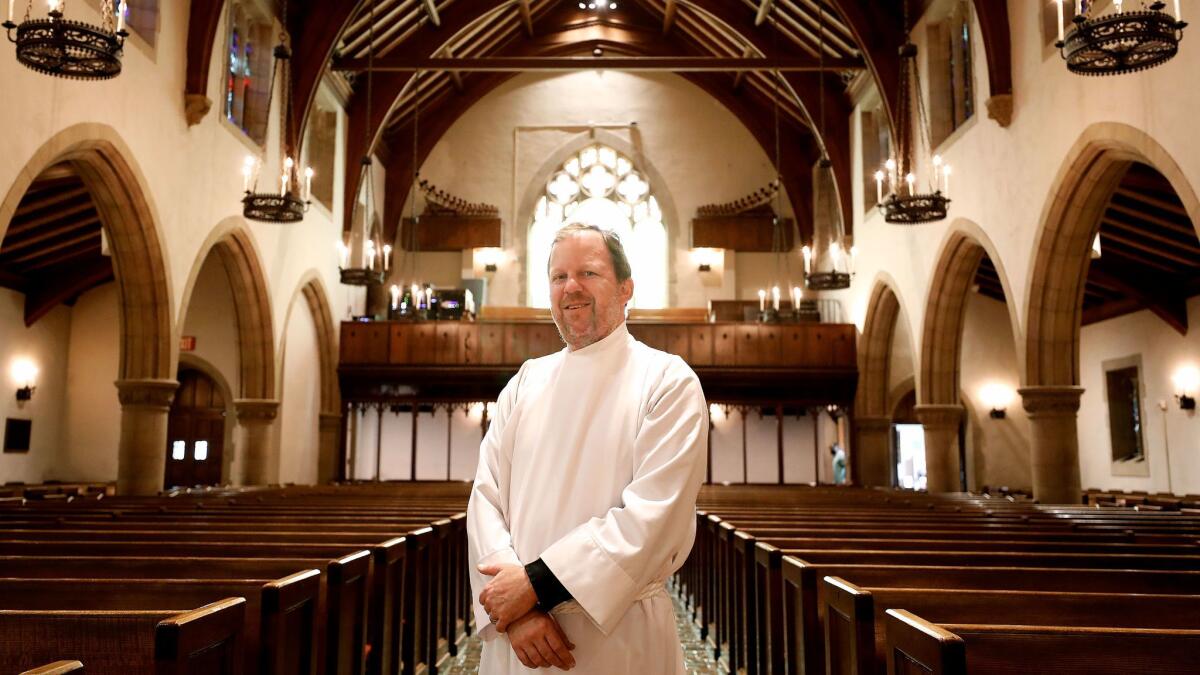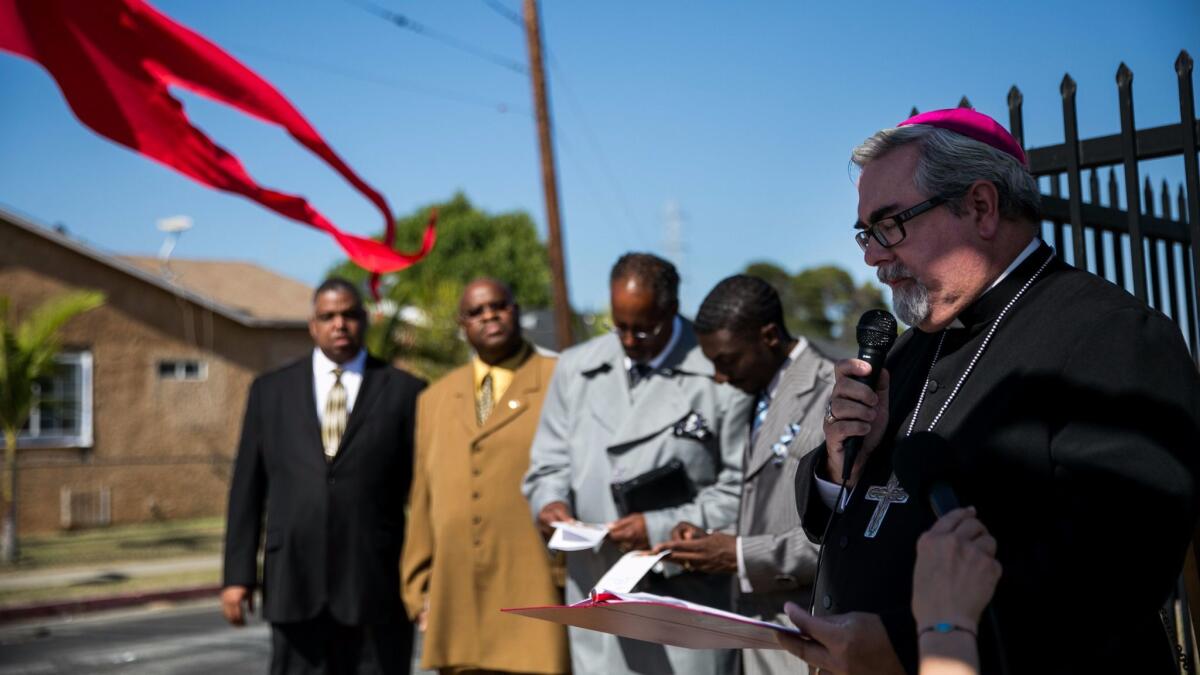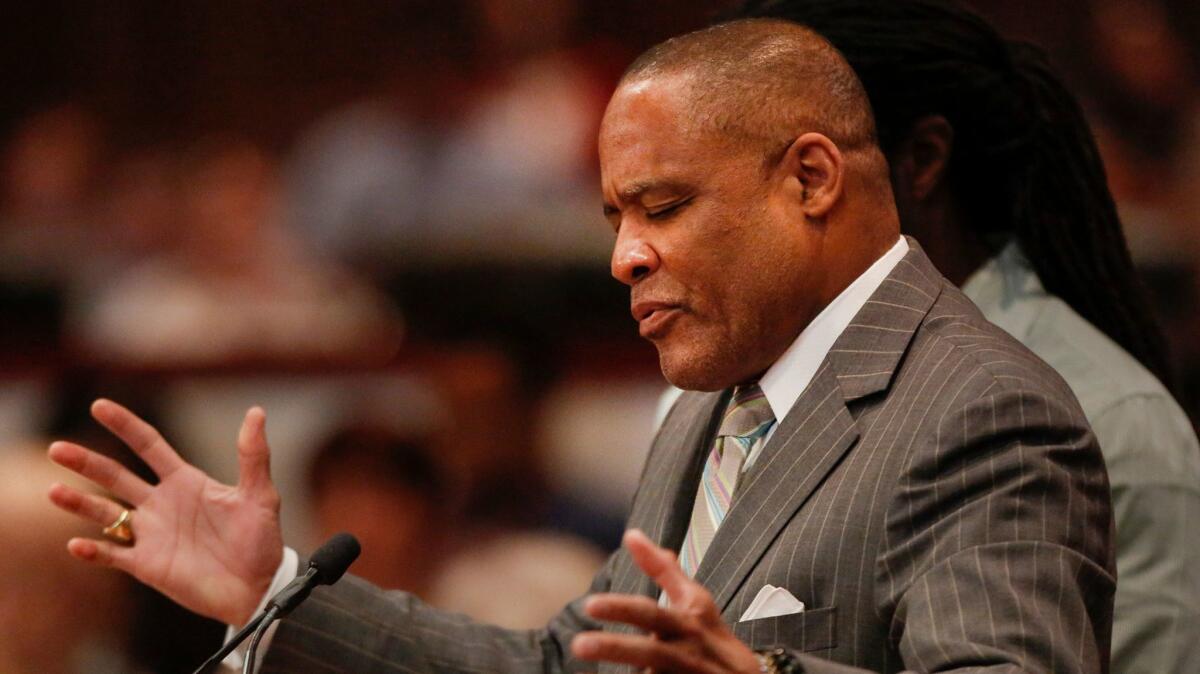Religious leaders question why Republican tax plan would allow churches to endorse candidates

An antiwar sermon at All Saints Church in Pasadena two days before the 2004 presidential election triggered an Internal Revenue Service investigation that threatened the church’s tax-exempt status.
But that hasn’t stopped All Saints from taking on contentious issues, as it did on a recent Sunday when the Rev. Mike Kinman preached about sexual assault against women. He also spoke of another hot-button issue: the Republican tax plans.
Tucked within the House version of the tax bill — which still must be reconciled with the separate Senate version — is a proposal that likely would have kept the feds away from All Saints 13 years ago.
The House version significantly weakens the Johnson Amendment, a 1954 law that bars tax-exempt organizations from engaging in political activity. The provision would give churches and other nonprofits much more leeway to endorse candidates.
Whether the provision remains in the tax bill could be known as early as Wednesday, when Republican leaders are expected to unveil a new version that would reconcile differences between the House and Senate versions.
Even if the proposal is removed, other efforts to roll back the Johnson Amendment are underway in Congress.
Despite his church’s history with the IRS, Kinman said the Johnson Amendment should remain.
“It is absolutely not my role to tell someone, ‘You should vote for this person’ as a faith issue,” he said. “As soon as you identify with one candidate as the church, it is too tempting — frankly, the scriptural term for it is idolatry — to say, ‘We’re going to be partisan for this person.’ And then how do you speak truth to that person?”
Nixing the Johnson Amendment is seen as a nod to President Trump’s base. Evangelical Christian groups have argued the amendment is an unconstitutional violation of a pastor’s right to free speech.
“We hear from hundreds of pastors across the country fearful of jeopardizing their churches’ IRS status,” said Christiana Holcomb, legal counsel for the Alliance Defending Freedom, a conservative Christian advocacy group that has been at the forefront of trying to overturn it.
But in California — among the nation’s most religiously diverse states — there is little desire from religious leaders to revoke the amendment.
Many of the state’s congregations are traditionally conservative, and others are very liberal. Others, like the Catholic church, hew to conservative positions on issues like abortion but strongly support the rights of immigrants in the country illegally.
It is absolutely not my role to tell someone, 'You should vote for this person' as a a faith issue.
— Rev. Mike Kinman, All Saints Pasadena
Trump’s base is small in California, even among Christians, said Tommy Givens, an assistant professor of New Testament studies at Fuller Theological Seminary in Pasadena.
“I expect that a repeal [of the Johnson Amendment] would be greeted broadly in California with widespread concern about the erosion of institutional separation between church and state,” Givens said.
Polls show that Catholic voters in 2016 were split between Donald Trump and Hillary Clinton, and Catholics “come down on both sides of most issues today,” said Father Thomas Rausch, professor of theological studies at Loyola Marymount University.
“Bishops are very reluctant in telling Catholics how to vote,” he said. “At the same time, that doesn’t mean the church doesn’t have a political voice, because they certainly can preach about moral and social issues. They’ve been very outspoken on the new tax bill and the need for immigration reform.”

The Rev. Mark Whitlock, executive director of the USC Cecil Murray Center for Community Engagement, believes the anti-politicking rule should be repealed because, in churches, “there’s always been the undercurrent of who we want in office.”
Whitlock — who has served as pastor of Christ Our Redeemer African Methodist Episcopal Church in Irvine for two decades — said black churches have long supported candidates they believe will help the disenfranchised.
During the 2008 election, Whitlock said, he stood before his 3,500-member congregation and said, “I support Barack Obama.”
Most of the crowd cheered. A group of Clinton supporters walked out, furious. Whitlock got calls from Republican members of his congregation and from others worried the church would lose its 501(c)(3) status.
“You would have thought I committed a cardinal sin,” Whitlock said. “I tend not to hold back and take the risk of finding myself in trouble. I am cognizant of the fact there’s a law and I have a responsibility as a pastor to be creative. But why not have the opportunity to speak freely?”
Trump has vowed to “totally destroy” the Johnson Amendment since he was on the campaign trail. Changing the law would require an act of Congress.
Doing so is deeply unpopular with the American public.
A recent survey by the Program for Public Consultation at the University of Maryland found that 79% of voters oppose scrapping the Johnson Amendment. The results, released last month, show 71% of Republicans, 88% of Democrats and 78% of independents were against doing so.
“People are just so tired of the level of partisan polarization, and the idea that it would creep into yet one more area of their life doesn’t sound very appealing,” said Steven Kull, director of the Program for Public Consultation.

The anti-politicking rule has not been widely enforced. Since 2008, thousands of pastors have participated in Pulpit Freedom Sunday, a nationwide, coordinated preaching effort promoted by the Alliance Defending Freedom in which they challenge the ban by getting political in sermons and sending recordings to the IRS. Only one participating church has been investigated, Holcomb said.
Givens, of Fuller Seminary, compared the push to get rid of the Johnson Amendment to the so-called war on Christmas. He said it’s a superficial move that plays well with conservative Christians who believe their faith is under attack.
“There’s a very powerful narrative in conservative Christian parts of the country of losing power, of losing the society that they want, that they think God wants,” he said. “So I think the Johnson Amendment, like saying ‘merry Christmas,’ enables the Trump administration and the Republican party to deliver to that sense of nostalgia and sense of loss.”
Even now, Givens said, plenty of politicking happens in churches. There are certain issues — like abortion on the right and LGBTQ rights on the left — that congregations take stands on that are linked with certain candidates, Givens said.
“There are all sorts of dog whistles that are blown,” he said.
Bishop Guy Erwin of the Southwest California Synod of the Evangelical Lutheran Church in America, said he fears a repeal of the amendment would result in politicians “chasing religious leaders for endorsements.”
“The job of clergy is to teach the faith,” he said. “It is not to be power brokers who try to line up the vote for an individual candidate.”
Erwin said the church is bound by Christian duty to stand against racism, anti-immigrant prejudice and mistreatment of the poor.
There are all sorts of dog whistles that are blown.
— Tommy Givens, assistant professor at Fuller Theological Seminary in Pasadena
But even that can seem to have political overtones these days, he said. Just after the 2016 election, Erwin said, a Lutheran bishop in Texas said a congregant complained that a sermon on the Beatitudes — Blessed are the poor in spirit...Blessed are the meek — was being preached “to make Trump sound bad.”
At All Saints Church, activism dates back to the 1940s, when the church’s rector stood in front of trains to protest the internment of Japanese Americans.
The 2004 sermon that prompted the IRS investigation — which did not include an endorsement — included an imagined dialogue between Jesus, Sen. John F. Kerry and President George W. Bush. Jesus chided both for supporting the war in Iraq and speaking so little about the poor.
In 2007, the IRS said it thought the church had tried to influence votes but that officials would not revoke its tax exemption.
Outside the church on a recent Sunday were tables touting the church’s LGBTQ, Middle East and racial justice ministries. An “action table” each week details a cause and includes forms for writing to elected officials.
Elizabeth Tatum, 52, chatted with church-goers at an action table focusing on the plight of Palestinian children. Tatum, who has attended the church since she was 2 and was present for the controversial 2004 sermon, loves its activist spirit.
But she, too, favors the Johnson Amendment.
“You have to have a respect for people with different views,” she said. “People shouldn’t just be sheep blindly following their pastor.”

Twitter: @haileybranson
Sign up for Essential California
The most important California stories and recommendations in your inbox every morning.
You may occasionally receive promotional content from the Los Angeles Times.








